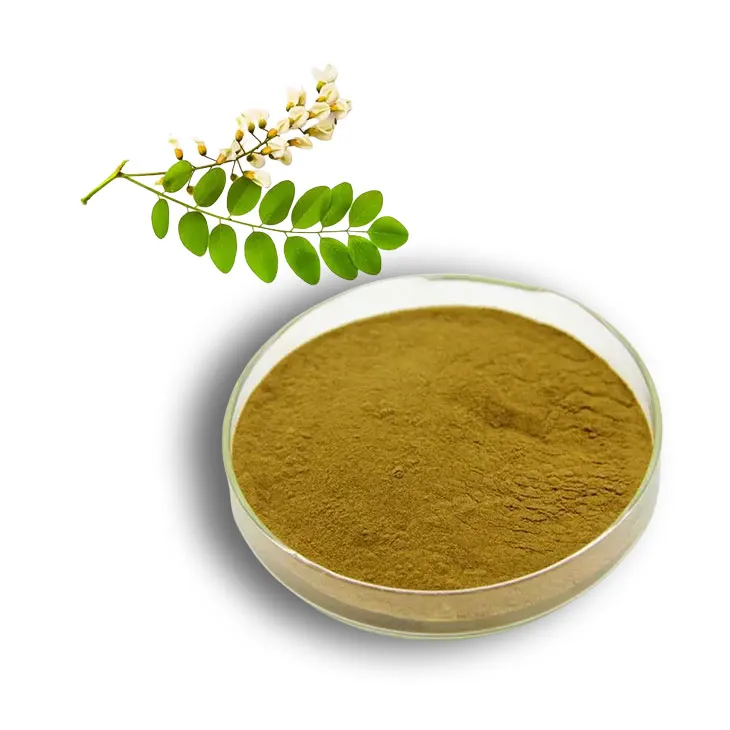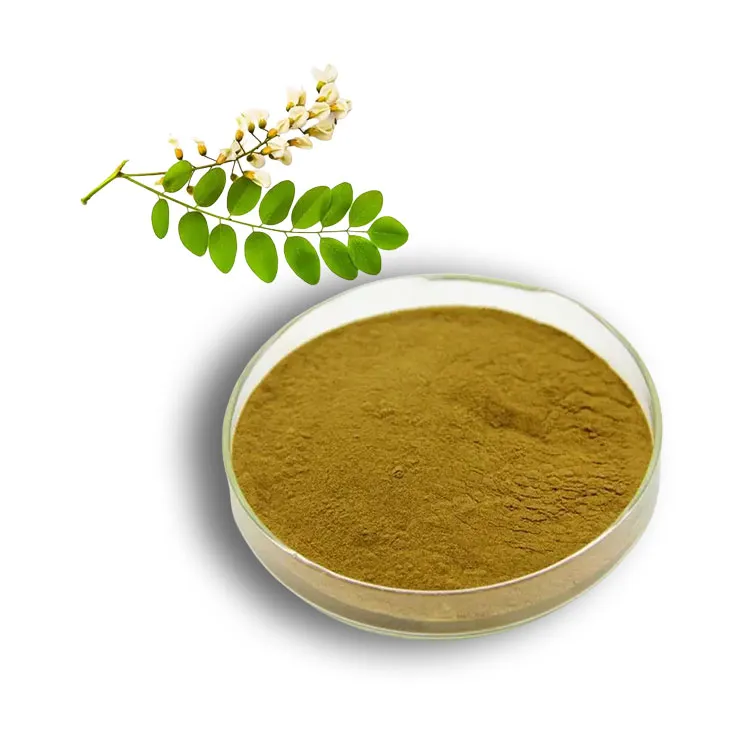- 0086-571-85302990
- sales@greenskybio.com
Is sophora japonica flower extract beneficial for diabetes? Are these all safe and suitable for diabetic patients?
2024-11-11

1. Introduction
Diabetes is a chronic metabolic disorder that affects millions of people worldwide. Management of diabetes often involves lifestyle modifications, medications, and sometimes the use of natural products. Sophora japonica, a plant native to Asia, has been used in traditional medicine for various purposes. In recent years, there has been growing interest in exploring whether the extract of Sophora japonica could have beneficial effects on diabetes. This article aims to analyze scientific research on the extract's role in diabetes, including its effects on glucose metabolism, lipid profile improvement, and anti - inflammatory properties. Additionally, it will discuss the safety profile of the extract in diabetic patients, considering different forms of the extract and its potential interactions with the body's normal physiological processes.

2. The Role of Sophora japonica Extract in Glucose Metabolism
2.1. Glucose Uptake and Insulin Sensitivity
Several studies have investigated the effect of Sophora japonica extract on glucose uptake in cells. Some in - vitro experiments have shown that certain components of the extract can enhance glucose uptake in muscle and fat cells. This is a crucial mechanism as it mimics the action of insulin. Insulin is the hormone responsible for facilitating the entry of glucose into cells, where it can be used for energy production or stored. By promoting glucose uptake, the extract may potentially help in reducing blood glucose levels in diabetic patients.Moreover, the extract has been shown to improve insulin sensitivity. In diabetic individuals, insulin resistance is a common problem. Cells become less responsive to insulin, leading to elevated blood glucose levels. Compounds in Sophora japonica extract may act on intracellular signaling pathways involved in insulin action. For example, they may modulate the phosphorylation of key proteins such as IRS - 1 (Insulin Receptor Substrate - 1), which is an important step in the insulin signaling cascade. By enhancing insulin sensitivity, the extract could assist in better glycemic control.
2.2. Glycogen Synthesis
Another aspect of glucose metabolism is glycogen synthesis. Glycogen is the storage form of glucose in the liver and muscles. Some research suggests that Sophora japonica extract can stimulate glycogen synthesis. This is beneficial because it helps to sequester excess glucose in the body. When blood glucose levels are high, the liver and muscles can convert glucose into glycogen for later use. In diabetic patients, where blood glucose regulation is impaired, promoting glycogen synthesis can contribute to maintaining more stable blood glucose levels. The extract may influence enzymes involved in glycogen synthesis, such as glycogen synthase, either directly or through regulatory mechanisms within the cell.
3. Lipid Profile Improvement by Sophora japonica Extract
3.1. Cholesterol Levels
Diabetic patients often have abnormal lipid profiles, including elevated cholesterol levels. Sophora japonica extract has been studied for its potential to lower cholesterol. Some components of the extract may interfere with cholesterol biosynthesis in the liver. They can inhibit key enzymes in the cholesterol synthesis pathway, such as HMG - CoA reductase. This enzyme is a target for many cholesterol - lowering drugs. By reducing cholesterol synthesis, the extract may help in decreasing total cholesterol levels in diabetic patients. Additionally, it may also have an impact on the ratio of LDL (low - density lipoprotein) to HDL (high - density lipoprotein). LDL is often referred to as "bad" cholesterol as it can contribute to the formation of atherosclerotic plaques, while HDL is considered "good" cholesterol as it helps in removing cholesterol from the body. The extract may potentially increase HDL levels and decrease LDL levels, which is beneficial for cardiovascular health in diabetic individuals.
3.2. Triglyceride Levels
Elevated triglyceride levels are also common in diabetes. The extract of Sophora japonica may play a role in reducing triglyceride levels. It could affect triglyceride metabolism in the liver and adipose tissue. For example, it may enhance the breakdown of triglycerides through activation of lipolytic enzymes. At the same time, it may also inhibit the synthesis of new triglycerides in the liver. This dual action can lead to a decrease in circulating triglyceride levels, which is important for reducing the risk of cardiovascular complications in diabetic patients.
4. Anti - Inflammatory Properties of Sophora japonica Extract
4.1. Inflammation in Diabetes
Chronic inflammation is closely associated with diabetes. Inflammatory cytokines and mediators are often elevated in diabetic patients. This low - grade inflammation can contribute to insulin resistance, beta - cell dysfunction, and the development of diabetic complications. Sophora japonica extract has been found to possess anti - inflammatory properties. It can modulate the production of inflammatory cytokines such as TNF - α (Tumor Necrosis Factor - α), IL - 6 (Interleukin - 6), and IL - 1β (Interleukin - 1β). By reducing the levels of these inflammatory mediators, the extract may help in improving insulin sensitivity and protecting pancreatic beta - cells from further damage.
4.2. Oxidative Stress and Inflammation
Oxidative stress is also a significant factor in diabetes - related inflammation. High blood glucose levels can lead to the overproduction of reactive oxygen species (ROS), which in turn can activate inflammatory pathways. The extract of Sophora japonica may act as an antioxidant, scavenging ROS and reducing oxidative stress. This antioxidant activity can then indirectly suppress inflammation. Some of the phenolic compounds in the extract are likely responsible for this antioxidant and anti - inflammatory effect. For example, flavonoids present in the extract can donate electrons to neutralize ROS and also regulate gene expression related to inflammation.5. Safety Profile of Sophora japonica Extract for Diabetic Patients
5.1. Different Forms of the Extract
Sophora japonica extract can be obtained in various forms, such as aqueous extracts, ethanol extracts, and standardized extracts containing specific active compounds. The safety of each form may vary. Aqueous extracts are generally considered to be relatively safe as they are more similar to traditional herbal preparations. However, they may contain a wide range of compounds, some of which may have unknown effects. Ethanol extracts may have different solubility properties and may contain higher concentrations of certain bioactive compounds. Standardized extracts, which are often used in research and commercial products, are formulated to contain a specific amount of active ingredients. While they offer more consistency in terms of composition, their long - term safety in diabetic patients still needs further study.
5.2. Potential Interactions
Diabetic patients often take multiple medications to manage their condition. There is a concern about potential interactions between Sophora japonica extract and these medications. For example, if the extract affects blood glucose levels, it could interact with antidiabetic drugs such as metformin or sulfonylureas. It may potentiate or interfere with the action of these drugs, leading to hypoglycemia (low blood glucose) or reduced effectiveness of the medications. Similarly, if the extract affects lipid metabolism, it could interact with lipid - lowering drugs like statins. Additionally, the extract may interact with other medications through mechanisms related to its anti - inflammatory or antioxidant properties. Therefore, it is essential to study these potential interactions thoroughly before recommending the use of Sophora japonica extract to diabetic patients.
5.3. Allergic Reactions and Toxicity
Some individuals may be allergic to Sophora japonica or its extract. Allergic reactions can range from mild skin rashes to more severe anaphylactic shock. Although allergic reactions are relatively rare, they need to be considered. In terms of toxicity, while there is no clear evidence of acute toxicity of the extract at normal doses, long - term or high - dose use may pose potential risks. Some components of the extract may accumulate in the body over time and could have adverse effects on the liver, kidneys, or other organs. Therefore, more research is needed to determine the safe dosage range for diabetic patients.6. Conclusion
The extract of Sophora japonica shows potential benefits in diabetes management in terms of its effects on glucose metabolism, lipid profile improvement, and anti - inflammatory properties. However, the safety profile of the extract in diabetic patients is still not fully understood. Different forms of the extract may have varying safety implications, and there are concerns about potential interactions with medications and possible allergic reactions or toxicity. Further research is required to fully elucidate the role of Sophora japonica extract in diabetes treatment and to ensure its safe and effective use in diabetic patients.
FAQ:
Question 1: What are the main components in Sophora Japonica Flower Extract?
The Sophora Japonica Flower Extract contains various components such as flavonoids, polysaccharides, and some phenolic compounds. Flavonoids are one of the main active ingredients, which may play important roles in potential health benefits.
Question 2: How does Sophora Japonica Flower Extract affect glucose metabolism in diabetic patients?
Some studies suggest that certain components in the extract may enhance insulin sensitivity. It might work by influencing the signaling pathways related to glucose uptake in cells. For example, flavonoids could stimulate the translocation of glucose transporters to the cell membrane, facilitating glucose entry into cells and thus helping to regulate blood glucose levels.
Question 3: Does Sophora japonica flower extract have any impact on lipid profiles in diabetic patients?
There is evidence indicating that the extract may have a positive effect on lipid profiles. It could potentially lower triglyceride levels and increase high - density lipoprotein (HDL) cholesterol. This may be related to its antioxidant and anti - inflammatory properties, which can reduce lipid peroxidation and improve lipid metabolism.
Question 4: Is Sophora japonica flower extract safe for long - term use in diabetic patients?
While in general, Sophora japonica flower extract has shown some potential benefits, its long - term safety in diabetic patients requires further study. Some forms of the extract may cause allergic reactions in a small number of people. Also, potential interactions with medications used to treat diabetes or other comorbidities need to be carefully considered.
Question 5: How does the anti - inflammatory property of Sophora japonica flower extract relate to diabetes?
Chronic inflammation is associated with diabetes. The anti - inflammatory property of the extract can help reduce inflammation in the body. By suppressing inflammatory cytokines and pathways, it may contribute to better glycemic control and overall health in diabetic patients. For example, it can reduce insulin resistance caused by inflammation.
Related literature
- The Role of Sophora japonica Extract in Metabolic Disorders"
- "Sophora japonica Flower Extract: Potential Benefits for Diabetes Mellitus"
- "Safety and Efficacy of Sophora japonica - Based Compounds in Diabetic Patients"
- ▶ Hesperidin
- ▶ citrus bioflavonoids
- ▶ plant extract
- ▶ lycopene
- ▶ Diosmin
- ▶ Grape seed extract
- ▶ Sea buckthorn Juice Powder
- ▶ Beetroot powder
- ▶ Hops Extract
- ▶ Artichoke Extract
- ▶ Reishi mushroom extract
- ▶ Astaxanthin
- ▶ Green Tea Extract
- ▶ Curcumin Extract
- ▶ Horse Chestnut Extract
- ▶ Other Problems
- ▶ Boswellia Serrata Extract
- ▶ Resveratrol Extract
- ▶ Marigold Extract
- ▶ Grape Leaf Extract
- ▶ blog3
- ▶ blog4
- ▶ blog5
-
Organic Tongkat Ali extract powder factory.
2024-11-11
-
How to make powder with ashwagandha extract.
2024-11-11
-
Rosehip extract manufacturers from China.
2024-11-11
-
The best cat's claw extract in nature.
2024-11-11
-
Chinese Dandelion Leaf Extract Suppliers.
2024-11-11
-
Kupilu Extract
2024-11-11
-
Panax Ginseng Leaf Extract
2024-11-11
-
Lavender Extract
2024-11-11
-
Pine bark Extract Powder
2024-11-11
-
Chasteberry Extract
2024-11-11
-
Lycopene
2024-11-11
-
Pueraria Lobata Extract
2024-11-11
-
Selenium yeast
2024-11-11
-
Angelica sinensis extract
2024-11-11
-
Cactus Extract
2024-11-11





















